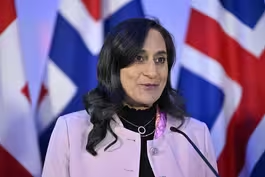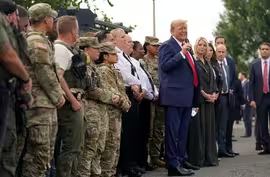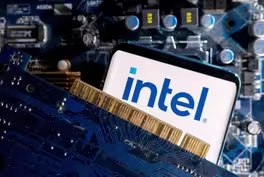
What Gabbard's ODNI cuts mean for U.S. intelligence agencies
Clip: 8/21/2025 | 7m 31sVideo has Closed Captions
What Gabbard's ODNI cuts mean for U.S. intelligence agencies
The Trump administration announced that the Office of the Director of National Intelligence would cut 40% of its staff. Tulsi Gabbard claims ODNI is "inefficient" and "rife with abuse." The office was created after 9/11 to coordinate the 17 intelligence agencies. Amna Nawaz discussed more with Sue Gordon, principal deputy director of national intelligence at the ODNI from 2017 to 2019.
Problems playing video? | Closed Captioning Feedback
Problems playing video? | Closed Captioning Feedback
Major corporate funding for the PBS News Hour is provided by BDO, BNSF, Consumer Cellular, American Cruise Lines, and Raymond James. Funding for the PBS NewsHour Weekend is provided by...

What Gabbard's ODNI cuts mean for U.S. intelligence agencies
Clip: 8/21/2025 | 7m 31sVideo has Closed Captions
The Trump administration announced that the Office of the Director of National Intelligence would cut 40% of its staff. Tulsi Gabbard claims ODNI is "inefficient" and "rife with abuse." The office was created after 9/11 to coordinate the 17 intelligence agencies. Amna Nawaz discussed more with Sue Gordon, principal deputy director of national intelligence at the ODNI from 2017 to 2019.
Problems playing video? | Closed Captioning Feedback
How to Watch PBS News Hour
PBS News Hour is available to stream on pbs.org and the free PBS App, available on iPhone, Apple TV, Android TV, Android smartphones, Amazon Fire TV, Amazon Fire Tablet, Roku, Samsung Smart TV, and Vizio.
Providing Support for PBS.org
Learn Moreabout PBS online sponsorshipAMNA NAWAZ: The Trump administration# announced yesterday that the Office of## the Director of National Intelligence,# or ODNI, would have its staff cut by## 40 percent for a cost savings, they# say, of more than $700 million a year.
Tulsi Gabbard, the director# of national intelligence,## said -- quote -- "Over the last 20 years,# ODNI has become bloated and inefficient,## and the intelligence community# is rife with abuse of power,## unauthorized leaks of classified intelligence,# and politicized weaponization of intelligence."
The ODNI was created after the# September 11 attacks to better## coordinate the 17 separate intelligence agencies.
To help explain the changes being# made to the intelligence community,## we turn now to Sue Gordon.
She had a# decades-long career at the CIA and was## the principal deputy director of national# intelligence at the ODNI from 2017 to 2019.
Sue Gordon, welcome back to the "News Hour."
So a 40 percent staff cut, what's your reaction# to that?
What kind of impact will that have?
SUE GORDON, Former U.S. Principal# Deputy of National Intelligence: Well,## one, thanks for havi..
When I looked at what's been released, I kind# of had the reaction of, there's some good,## there's some bad, and there's some# dangerous.
So I think the good is,## any organization that's 20 years old,# particularly a staff organization,## you ought to look at it to make sure that it# hasn't grown beyond what it was intended to do.
So I think some of the things I see in there# are well-placed, just make sure that they're as## efficiently done and whether they still need to be# done at the ODNI now 20 years after its formation.
I think what is potentially bad# is, I see no definition of what## the ODNI is going to do.
Like, what's# its mission?
When it was first formed,## it was really to do policy and oversight and# to align the community.
In the middle years,## it was to integrate intelligence, so you had# the best of all the agencies in the product.
And in the years that I was there, we were# trying to do more leadership using the budget## to make sure that we could invest across# the community in artificial intelligence## and make a move to China.
Well, what# is this ODNI going to be?
And if you## don't know what it's going to be and# you're going to cut it by that much,## you run the risk of damaging the foundation of# what you're going to need to support policy.
And the dangerous piece is, I'm pretty on the# record here, I think the predicate for this, that## the intelligence community has become malfeasant# in some way or corrupt or abuse or politicized,## I find that to be completely inconsistent# with my 30-plus years of experience.
And,## more, some of the things they# talk about of aligning it to## a particular view of what the policy# is, is antithetical to intelligence.
And the dangerous piece is,# you actually make it worse.
AMNA NAWAZ: Well, let me ask you a little bit more# about that, because one of the core justifications## that Director Gabbard laid out was what she# says, this effort to return to ODNI's core## mission, as she put it, to provide objective# and unbiased intelligence to the president.
She cited specifically the weaponization of# intelligence.
And she also referenced the## intelligence community's assessment# that Russia interfered in the 2016## election with the goal of trying# to help then-candidate Trump win,## which Gabbard says was false.# So what's your reaction to that?
SUE GORDON: Well, I think -- I think that's# a statement being made by this administration## that supports a view that they'd like to# have.
I think this has been reviewed over## and over.
The assessment itself has been# validated not only by DCI Ratcliffe's own## relook at that assessment, that, though# it did find some tradecraft issues,## it did say that the conclusions that Russian# intended to influence our election was valid.
Then the Senate Select Committee on# Intelligence, on which Marco Rubio sat,## had an extensive view that again validated the# Durham report, validated it.
And so I just think## that the information that the administration is# putting out to try and counter it, and, far worse,## the actions they're taking against some really# talented officers in that name, it's dangerous.
But let's just put it in context.# The people who are trying to align## the intelligence meaning to a particular# view seem to be this administration.
But## the issue is, intelligence is the one# discipline that is policy-independent.
What you want intelligence to do is to have# as many views as you can to put down what## is perceived to be the best known collective# information so that the policymaker can decide## on a policy with a really clear view.
When# you start using intelligence and shaping it## to be ahead of time only supportive of policy,# you undermine its value in national security.
AMNA NAWAZ: And we should note there's a number## of specific centers and agencies# being eliminated.. Related to the note earlier you made, there's# one called the Foreign Malign Influence Center## that looks at foreign interference in# American democratic processes.
But,## Sue, can I ask you to step back for# just a moment and kind of assess... SUE GORDON: Sure.
AMNA NAWAZ: ... where we are with this#.. intelligence agencies, because he's# publicly disagreed with them at times.
What is your assessment, based on# your time in government service,## of how President Trump is using the# intelligence that he's being briefed on?
SUE GORDON: Yes, I think one of the# things that people should know is,## intelligence is almost always inconvenient.
I remember walking into a different president's# office and sharing some information, and he said,## you have just stolen some of my decision space,# because the policy is the policy.
Sometimes,## you walk in the door and you# have inconvenient information.
An example, Russia has no intention# of seeking peace right now in Ukraine,## that's inconvenient information that I# would expect this intelligence community,## if it had that, would present the president,## or that the intelligence community finds that Iran# is not imminent in developing a nuclear weapon.
And the president's saying that's wrong.
He can# do whatever he wants with policy.
But it becomes## dangerous when you try and shape the intelligence# to fit the policy you want, because you eliminate## its value to you.
Intelligence is about seeing# what is not what you prefer, and you want it to## be able to walk in, say inconvenient things,# so that it helps the decisions be better.
And I think you can look at the record and# see that, going back to the president's## first administration, where I served, and# now accelerating, and now accelerating the## actions to shape the community so it doesn't# do anything (INAUDIBLE) is a destructive turn.
And it's destructive for the president in# terms of the decisions he wants to make.
AMNA NAWAZ: Sue Gordon, former# intelligence official joining us tonight.
Sue, thank you for your# time.
Good to speak with you.
SUE GORDON: Great to see you again.
Appeals court dismisses $500M fraud penalty against Trump
Video has Closed Captions
Clip: 8/21/2025 | 7m 56s | New York appeals court throws out $500M fraud penalty against Trump (7m 56s)
Canada's foreign minister on the future of U.S. relations
Video has Closed Captions
Clip: 8/21/2025 | 9m 8s | Canada's foreign minister on U.S. relations and security guarantees for Ukraine (9m 8s)
July home sales up, offering momentum to struggling market
Video has Closed Captions
Clip: 8/21/2025 | 5m 46s | Home sales went up in July, offering momentum to a struggling market (5m 46s)
News Wrap: Trump greets National Guard troops in D.C.
Video has Closed Captions
Clip: 8/21/2025 | 10m 25s | News Wrap: Trump greets law enforcement and National Guard troops patrolling D.C. (10m 25s)
Tour of giant fantastic animals celebrates art of Oaxaca
Video has Closed Captions
Clip: 8/21/2025 | 5m 20s | Tour of giant, brightly colored creatures celebrates artistic heritage of Oaxaca (5m 20s)
Why the federal government could take a stake in Intel
Video has Closed Captions
Clip: 8/21/2025 | 6m 28s | Why the federal government could take a stake in Intel (6m 28s)
Providing Support for PBS.org
Learn Moreabout PBS online sponsorship
- News and Public Affairs

FRONTLINE is investigative journalism that questions, explains and changes our world.

- News and Public Affairs

Amanpour and Company features conversations with leaders and decision makers.












Support for PBS provided by:
Major corporate funding for the PBS News Hour is provided by BDO, BNSF, Consumer Cellular, American Cruise Lines, and Raymond James. Funding for the PBS NewsHour Weekend is provided by...





